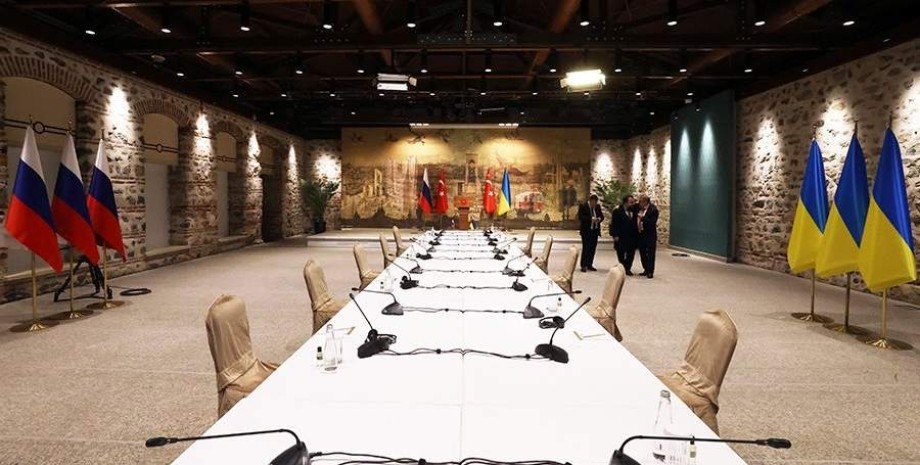
 By Eliza Popova
By Eliza Popova
Only a few points remained open, which were personally discussed by Vladimir Putin and Volodymyr Zelenskyy at the summit, but this did not happen. The German edition of Die Welt reported that it has the original document. The first paragraph of the contract stipulated Ukraine's obligations to comply with "permanent neutrality". This status was to be enshrined in the Constitution. Thus, Kiev had to give up any membership in the military union.
The issue of NATO's accession to NATO would have been removed. Ukraine had to never "receive, produce" nuclear weapons, prevent foreign weapons and troops into its territory and not to provide its military infrastructure, including aerodromes and seaports, any other country. In addition, Kiev was to refrain from conducting military exercises with the participation of foreign troops, and not to participate in any military conflict.
At the same time, nothing directly prevented Kiev from becoming a member of the European Union. In response, Russia allegedly promised not to attack Ukraine anymore. So that Kiev could be sure of this, Moscow agreed that five permanent members of the UN Council - the USA, the United Kingdom, France, China and Russia itself can provide Ukraine with comprehensive security guarantees.
In the case of an "armed attack on Ukraine", garant countries pledged to support Kiev in his right to self-defense, assigned to the UN Charter, within three days. This treaty was to be ratified by every state that signed it. Die Welt writes that both sides have developed a mechanism that is significantly different from the 1994 Budapest Memorandum. At that time, Russia also guaranteed Ukraine territorial integrity.
The Western powers promised Kiev support in the event of an attack, but did not guarantee it. However, these security guarantees would require the approval of the United States, China, the United Kingdom and France in the second stage. Moscow also wanted to include Minsk, and Kiev - Ankara. The purpose of the participants of the then negotiations in Istanbul was to create a "unity between Kiev and Moscow" to continue to use the document as a basis for multilateral negotiations.
Crimea and port of Sevastopol were excluded from security guarantees. Kiev actually transmitted control of the peninsula. According to the document, it is unclear which part of Eastern Ukraine should be excluded from the promise of guarantors. The corresponding places had red marks. In Istanbul Communique, Kiev allegedly agreed to exclude parts of Donetsk and Luhansk regions, which Russia had already controlled before the war.
The Russian delegation, on the contrary, insisted that the borders were identified personally by Putin and Zelensky and put them on the map. The Ukrainian delegation rejected this option. Moscow rejected Kyiv's demand for garant countries to create a faultless area over Ukraine in the event of an attack. During the negotiations, Russia gave a signal to leave Ukraine, but not from the Crimea and part of the Donbass, which should be excluded from security guarantees.
The heads of state had to discuss the details of the exit personally. The publication claims that this information was confirmed by two participants in the Ukrainian delegation. The issue of the future number of the Ukrainian army remained unresolved. Kyiv allegedly partially answered Russia's demands on demilitarization. Moscow demanded that Kyiv cut up to 85 thousand soldiers from Kiev. Ukraine proposed to fix the number of troops of 250 thousand soldiers.
The parties did not agree on the number of military equipment. Russia demanded to reduce the number of tanks to 342, and Kiev wanted to leave 800. Ukraine agreed to reduce the number of armored vehicles to 2400 units, and Russia insisted on leave 1029 units. There were also differences in artillery. Moscow talked about 519 units, and Kiev - 1900.
Reactive volley fire systems under the plan of Ukraine should remain 600, and according to the plan of the Russian Federation - 96, and then with a maximum range of 40 kilometers. Russia's desire to reduce the number of mortars to 147, and anti -tank missiles - to 333, the desire of Kiev - 1080 and 2000 units, respectively. Further, Moscow demanded to leave 102 fighters and 35 helicopters, Kiev insisted on 160 aircraft and 144 helicopters.
According to Russian ideas, warships should be 2, according to Ukrainian - 8. However, after a summit in Istanbul, Moscow made the following requirements that Kiev did not agree. The Kremlin demanded to make Russian the second state in Ukraine, to abolish mutual sanctions and to end lawsuits in international courts. Kyiv also had to prohibit "fascism, Nazism and aggressive nationalism". "It was the best deal we could have," these words of an unnamed Ukrainian delegation member quoted Die Welt.
The publication believes that even after more than two years of war, this agreement still looks profitable in retrospective. "Ukraine has been holding on defense for several months and bearing great losses. Looking back, it can be said that Ukraine was in a stronger negotiating position than it is now. If the war was over about two months after its beginning, it would save innumerable lives , - the authors of the material believe.
The participants of the negotiations then predicted that Zelensky and Putin would sign the document in April 2022. Die Welt noted that a member of the Ukrainian delegation and David Arahamia in November 2023 suggested why the leaders of the two states did not meet. Boris Johnson came to Kiev on April 9, and said London would "sign" with Putin, and Ukraine should continue fighting. Later, Johnson rejected this thesis.
However, there are reasons to believe that the proposal to provide security guarantees to Ukraine in agreement with Russia has already failed at this stage, sums up the German edition. We will remind, on April 19, the Minister of Foreign Affairs of the Russian Federation Sergey Lavrov stated that Russia does not plan to stop fighting in Ukraine, even if negotiations begin.










All rights reserved IN-Ukraine.info - 2022